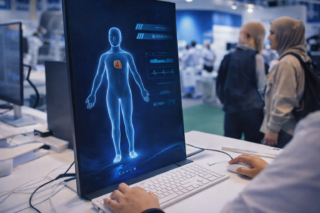As the hospital system crisis worsens, some see artificial intelligence (AI) as a potential ally to ease the burden on healthcare professionals. Yet this technology must be designed with, not against, those it claims to support.
By Gerald-Reparate Retali, Assistant Professor at Rennes School of Business, and Perrine Chapot, Founder of the start-up Ochy
A Structural Fatigue—Not Just a Personal One
Burnout among healthcare professionals is no longer a marginal concern, it has become a widespread and systemic phenomenon. In 2022, 44% of healthcare workers in France reported experiencing burnout, compared to 32% in 2018, according to the Empreinte Humaine barometer.
In the United States, over 60% of emergency physicians showed signs of professional exhaustion in 2022, and nearly one in five doctors was considering leaving the profession in the short term (Shanafelt et al., 2022). These figures point to an alarming deterioration in mental health within the health care sector.
The causes are well-known: administrative overload, staff shortages, emotional pressure, and a lack of recognition. These are structural factors that cannot be resolved through isolated or temporary measures. In this context, the modernization of the healthcare system—particularly through digital technologies and AI—sparks both hope and concern.
A Promise of Time-Saving… and Humanity
Many healthcare professionals now see AI as a potential lever to reclaim medical time—provided it remains a support tool, not a substitute. AI could help lighten the burden of repetitive tasks such as documentation, appointment scheduling, medical image analysis, and report generation. A 2024 study by Balloch et al. demonstrated that the implementation of ambient artificial intelligence can reduce consultation time by approximately 26.3%.
A Belgian nurse interviewed during a research project conducted across France, Belgium, and the United States described the integration of a chatbot into her hospital:
“We were able to focus more on complex cases and spend more time with patients.”
These experiences align with the vision championed by Eric Topol (2019), who argues that AI can augment medicine by freeing up time for the human relationship at the heart of care.
Distrust, Digital Overload, and Ethical Divides
However, the acceptance of AI largely depends on how it is implemented. Several healthcare workers have criticized top-down rollouts introduced without consultation or training.
“We’re being asked to use AI tools without any training, as if it were self-evident,” complained a nurse in an ophthalmology department.
The risk, then, is that a technology designed to support care becomes yet another source of overload. Poorly integrated, AI may create additional stress, complicate clinical routines, and reinforce the sense of disconnection already affecting many professionals.
Christophe Nguyen, occupational psychologist and founder of the consultancy Empreinte Humaine, warns:
“AI must be embedded in a comprehensive workplace quality-of-life strategy, not just a cost-cutting or technical logic.”
If it is used to “do more with less,” it may end up exacerbating the very harm it is meant to solve.
Governance and Co-Construction: The Keys to Success
To become a genuine driver of positive transformation, AI implementation must be based on three pillars: training, algorithmic transparency, and gradual integration that respects professional practice. Researcher Damien Richard advocates for the creation of communities of practice within healthcare institutions, so that caregivers can take ownership of the tools, adapt them to real-world situations, and share feedback.
Beyond the technical issues, it is governance that determines the true impact of innovation. Too often, psychosocial risks are absent from strategic discussions, even though they are a critical factor in healthcare performance. France’s Cour des comptes (Court of Audit) recently emphasized the urgent need to place caregiver well-being at the heart of health policy. As Christophe Nguyen puts it:
“As soon as an institution maps its risks, threats to mental health appear as critical as staff shortages or legal liabilities.”
Restoring Meaning to Care
AI alone will not save the hospital system. But if thoughtfully designed, co-developed with healthcare workers, and accompanied by time, training, and recognition, it can help ease the pressure on an exhausted system. Progress is not solely technical—it is deeply human.
In a healthcare system under constant strain, the challenge is not to do more, faster, but to do better. Better care, better collaboration, better respect for the values of healing. AI can contribute—if it is embedded in a broader policy of support for healthcare workers, rather than a narrow pursuit of productivity. Because the digital transformation of care will only succeed with them, not without them.
References
- Balloch, J., Sridharan, S., Oldham, G., Wray, J., Gough, P., Robinson, R., Sebire, N. J., Khalil, S., Asgari, E., Tan, C., Taylor, A., & Pimenta, D. (2024). Use of an ambient artificial intelligence tool to improve quality of clinical documentation. Future Healthcare Journal.
- Empreinte Humaine. (2022). National Barometer on the Psychological State of French Employees – 10th Edition.
- Shanafelt, T. D., Ripp, J., & Trockel, M. (2022). Understanding and Addressing Sources of Anxiety Among Health Care Professionals During the COVID-19 Pandemic. New England Journal of Medicine Catalyst Innovations in Care Delivery.
- Mayo Clinic & Stanford Medicine (2021–2022). Physician Well-being Reports.











